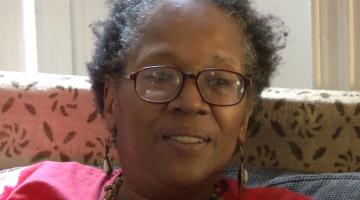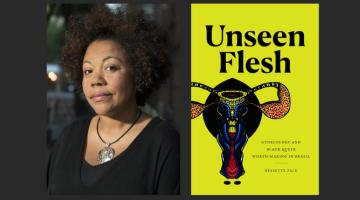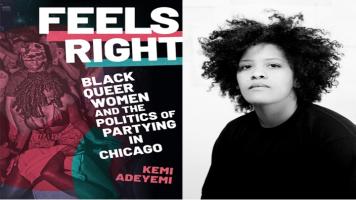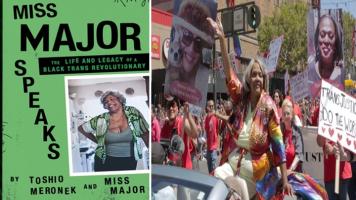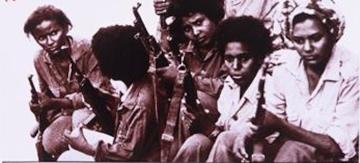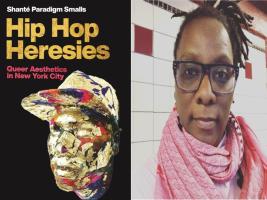In this series, we ask acclaimed authors to answer five questions about their book. This week’s featured author is Marlon B. Ross. Ross is Professor of English at the University of Virginia. His book is Sissy Insurgencies: A Racial Anatomy of Unfit Manliness.
Roberto Sirvent: How can your book help BAR readers understand the current political and social climate?
Marlon B. Ross: Sissy Insurgencies explores how black men, across history, have navigated the social and political demands to “man up” in order to prove themselves competent to the task of fighting for racial justice and black empowerment. Focusing on male gender conduct that is perceived as non-normative, the book suggests that the sissy figure is central to how Americans more generally have imagined, articulated, and negotiated the racial tenor of manhood and boyhood from the 1880s to the present. Against this sissy stigma, the study tracks a variety of occasions in which sissy conduct has been tapped in African American history to work on behalf of racial equality and social liberation. It further argues that the very fact of ongoing sissiphobia indicates how sissiness presents a threat to the hegemonic masculinity upon which white patriarchy is anchored. In other words, the black sissy embodies the political potential to disrupt the racist, sexist, heteronormative status quo. Despite the increasing legal and social inclusion of LGBTQ people as a legitimate “minority” group, the contempt for the sissy (the punk, the pussy, the wuss, and many related epithets) remains a punitive way to control appropriate manly conduct across all the venues where white masculine authority is sustained, including governance, religion, education, the military, sports, and political activism. This ongoing stigma against sissiness indicates to what extent conventional codes of masculine conduct continue to be highly valued for gauging who is worthy to lead the nation, and who is competent to fight for black empowerment. The presidency of Donald Trump has amplified how masculinist bullying remains a normative mode for sustaining white male power. The book encourages us to understand and value the sissy, and particularly the black sissy, as an insurgent political and activist resource against this white masculinist hegemony.
What do you hope activists and community organizers will take away from reading your book?
In African American culture especially, there is an overlooked history of the sissy as an agent of socio-political insurgency. Black men and boys have long been stereotyped as either always too masculine (“hypermasculine”) or never man enough (not law-abiding, not good providers, not suitable as military officers, etc.) — a racial caricature intended to designate them as incompetent members of the race as well as deficient members of society more generally. This caricature is usually taken as purely negative. This refusal to conform to the ideals and norms of white supremacist masculinity, rather than being a weakness, is in actuality a potential strength. I provide a host of historical and contemporary examples of black men, “straight” and queer, who tap into sissiness as a resource for disrupting, subverting, and dismantling the assumptions and prerogatives of white male supremacy — both in small, ordinary, everyday ways and in epic, extraordinary, historic ways. The study draws on a wide range of examples across the political spectrum, from the accommodationist politics of Booker T. Washington, to the integrationist politics of James Weldon Johnson as first black head of the NAACP, to the radical activism of James Baldwin, to the revolutionary activism of the Black Panthers. Given how sissy stigma derives ultimately from gender-role misogyny, the idea that a sissy cannot be insurgent — that is, cannot be at the forefront of racial justice movement — derives ultimately from a suspicion of women’s place on the frontline of racial liberation. To embrace the political and activist potential of the sissy, then, is to understand more deeply how categorical gender exclusions work to impede collective organizing for racial empowerment and progress. Sissy insurgency becomes an effective means for undermining simultaneously the gender hierarchy and the co-dependent racial hierarchy upon which white male supremacy thrives.
We know readers will learn a lot from your book, but what do you hope readers will un-learn? In other words, is there a particular ideology you’re hoping to dismantle?
There are three major gender-racial ideologies I hope to disrupt. First, I want to caution against gender assumptions that tend to oversimplify the relationship between same-gender attraction and non-normative gender conduct — a tendency to equate being a sissy with being gay, for instance. At the same time, I want to caution against the assumption that embracing greater inclusion for gay men will necessarily lead to greater respect for sissies. Gay men have frequently sought greater respect by distancing themselves from gender non-conforming men — a mode of gender respectability politics that is fundamentally anti-queer. Second, I want to counter a gross overgeneralization that types black people, especially black men, as the primary agents of American homophobia, while not discounting black homophobia as an issue to be tackled. The success of the mainstream gay-lesbian movement has depended on a tried-and-true formula of scapegoating black men, in particular, as dangerously homophobic — targeting them as the primary opponents to LGBTQ+ inclusion. This deliberate mischaracterization of figures like Dave Chapelle, most recently, bespeaks a misbegotten strategy of claiming the right to equitable citizenship by pitting the LGBTQ+ agenda against an out-of-control blackness not worthy of the equality promised by the 1960s Civil Rights victories. Contrary to this mischaracterization, this study illustrates how African Americans have experimented with, practiced, and performed what we now call gender fluidity since the days of enslavement. Third, rather than being marginal, subordinated, and invisible, sissies have been not only liminal but also central to the negotiation of institutional power in every venue where white men have sought to exclude those deemed racially inferior or gender unworthy. Indeed, black sissies have, like black women, been not only active in, but also helping to lead, the struggle for racial justice for generations.
Who are the intellectual heroes that inspire your work?
James Baldwin occupies a central place because his work as a writer, activist, and intellectual anchors my own understanding of how history and culture shape human desire, and vice versa, in ways that language cannot fully account, although we must always try. Baldwin articulated the prevalence of black queer desire in places where we’d least expect it to be, and he did so without cordoning such desire off into a mystifying isolatable category. The English cultural historian Raymond Williams has served for me a model of how to try to think beyond ideas, beliefs, and ideologies to account for the complex messiness of both individual and collective lived experience — feelings, sensations, gestures, habits, intonations, inclinations. Although W. E. B. Du Bois comes in for some harsh critique in my book, like so many authors, I find his scholarship — particularly Black Reconstruction in America — to be essential for understanding the ongoing “problem of the color-line.” In Black Reconstruction, for instance, Du Bois illustrates in vivid detail how the Civil War was not only fought to free the enslaved, but also, more radically, how the enslaved and freed people are essential, self-aware agents in the defeat of the Confederacy, on and off the battlefield. I admire black feminists like Barbara Smith and Barbara Christian, who early on brought attention to the interconnectivity across social identities, anticipating theories of intersectionality later developed by thinkers like Kimberlé Crenshaw. I don’t know what my work would be like without the insights of cultural theorist Hortense Spillers; I just know that it would be all the poorer. My thinking would also not be possible without the exciting forays made by a younger generation of black queer theorists. Although too numerous to name here, citation of their work is scattered all over my book.
In what way does your book help us imagine new worlds?
I believe that we have much to learn from black sissies owing to a cultural tradition of fierce sissiness claiming respect, if sometimes begrudging, in black communities, from the pulpit to the street corner, from the basketball court to the front lines of community organizing. The study emphasizes how the appeal to fit manhood through the lens of hegemonic masculinity always encodes and enjoins particular unwarranted assumptions about a male’s gender conduct as a manifestation of his moral character. Calling into question this unjustified moralism, I’m seeking to shift gender, race, and queer theory and activism more toward engagement with ethics. Ultimately, without a radical revisioning of what we collectively value, we cannot chart a path toward a transformed body politic. My call to embrace the sissy, rather than being a liberal apology for assimilationist inclusion, is based in a belief that such inclusion can disrupt baneful conventions and practices upholding deleterious gender hierarchies that ultimately benefit white masculinist ideologies of power. Although my study does not explicitly imagine a world in which radical gender inclusiveness topples white supremacy, I hope that it sustains this transformative struggle — not only intellectually but also in terms of everyday experience and ordinary interactions within and across communities — a struggle to purge the stigmatizing distortions of others, and the fears and violence embedded in such stigmatization. In this sense, perhaps radical sissy inclusiveness allows us from our current valley of discontent to peer over the hills to that beloved community that the ancient “Negro” spirituals imagined.
Roberto Sirvent is editor of the Black Agenda Report Book Forum.

